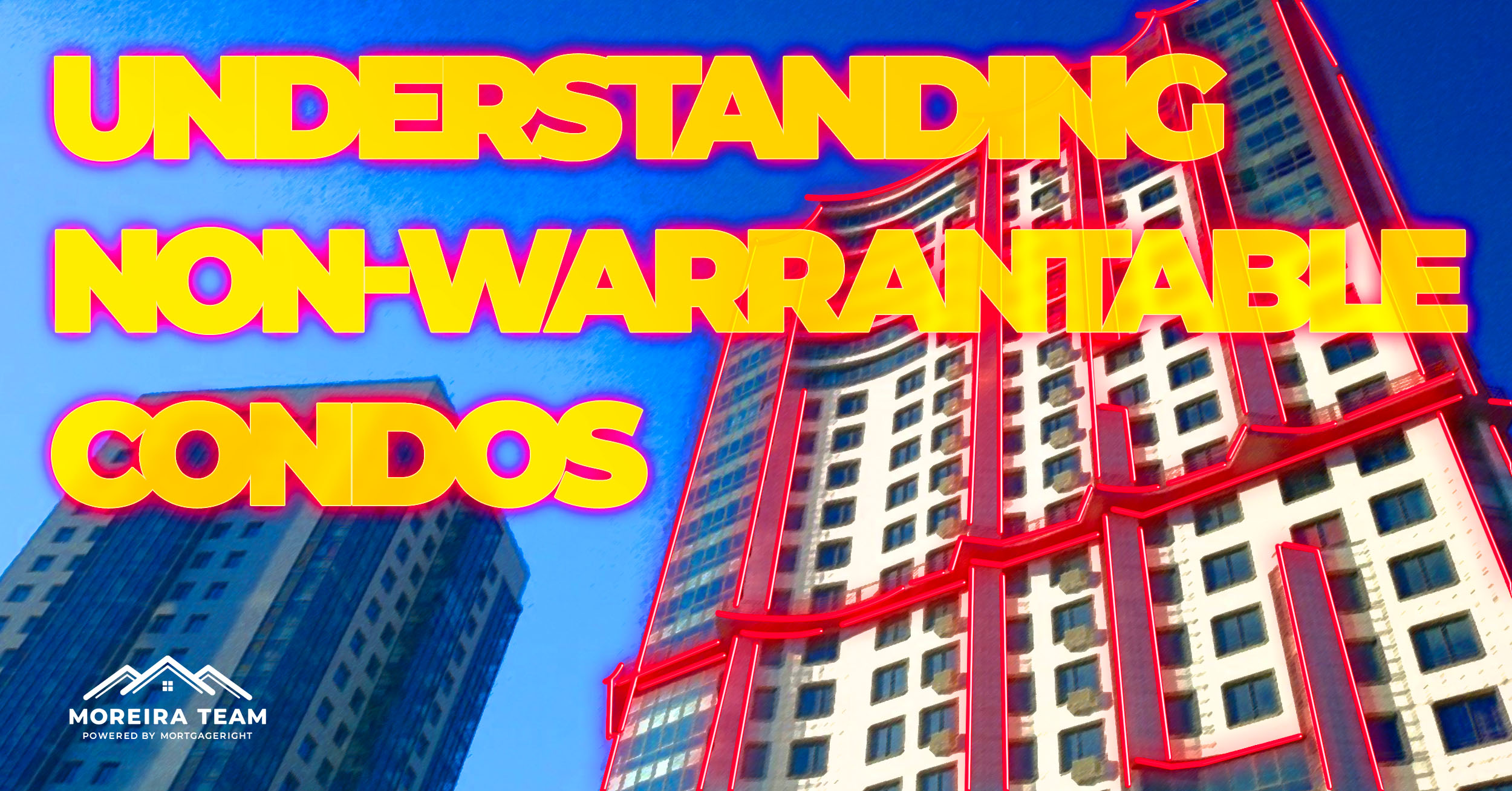
In this article
- Key Takeaways
- Why Would a Condo Be Non-Warrantable?
- How Do I Qualify for a Non-Warrantable Condo Loan?
- Non-Warrantable Loans Aren’t Always Easy
- Is It a Good Idea to Get a Non-Warrantable Condo Loan?
- The Moreira Team Can Help You Get Started
- Understanding the Challenges and Solutions
- Navigating the Legal Landscape
- The Role of Condo Associations
- You’ve got this
Whether you’re a seasoned home buyer or just starting out in your mortgage journey, navigating the ins and outs of the real estate market can be challenging. One of the more confusing aspects is what makes a condo non-warrantable and how this status affects mortgage rates in Georgia. Following the collapse of the condominium building in Seaside, Florida, Fannie Mae and Freddie Mac imposed tighter restrictions on condo loans, resulting in many condos with deferred maintenance, non-compliant occupation percentages, or legal issues no longer qualifying for traditional loans.
You know that song, “The Devil Went Down to Georgia?” Well, who knows if he really did, but one thing is for sure—the devil is in the details when looking into mortgage companies in Georgia.

Key Takeaways
- Non-warrantable condos are typically excluded from traditional mortgage financing.
- A few factors can make a condo non-warrantable, including investor ownership and pending legal issues.
- Obtaining a non-warrantable condo loan requires specific qualifications and often involves higher interest rates.
- Real estate professionals can provide guidance on whether pursuing a non-warrantable condo loan is a good idea.
Why Would a Condo Be Non-Warrantable?
Here are some common reasons a condo might be deemed non-warrantable:
Investor Ownership: If more than 50% of the units are owned by investors rather than owner-occupants, the condo is typically considered non-warrantable. Think of it as a condo that’s more like a game of Monopoly than a neighborhood.
Pending Legal Issues: Ongoing litigation involving the condo association or the property itself can also make a condo non-warrantable. It’s like buying a house that comes with a free lawyer you never wanted.
Inadequate Reserves: Condos must have sufficient reserve funds for future repairs and maintenance. If the reserves are lacking, the condo may not meet the criteria for traditional financing.
Commercial Space: A high percentage of commercial space within the condo complex can also lead to non-warrantable status. Imagine living above a mall, convenient for shopping, not so much for getting a good night’s sleep.
See how much you can afford, it’s fast and easy. Start Here! (Mar 3rd, 2026)How Do I Qualify for a Non-Warrantable Condo Loan?
Qualifying for a non-warrantable condo loan involves meeting specific criteria:
- Credit: A strong credit score is essential. Lenders are more likely to approve borrowers with a a solid credit history.
- Income Verification: lenders require detailed documentation of income to ensure the borrower can make payments.
- Down Payment: a larger down payment is often required for non-warrantable condo loans compared to traditional loans.
- Cash Reserves: Having enough cash reserves can improve the chances of loan approval, as it demonstrates financial stability.
Non-Warrantable Loans Aren’t Always Easy
Securing a loan for a non-warrantable condo can be challenging for several reasons:
Require Specialized Lenders: not all lenders offer non-warrantable condo loans. Borrowers must find specialized lenders who handle these types of loans.
Portfolio Loans: These loans are often kept in the lender’s portfolio rather than sold on the secondary market, which can limit the number of lenders willing to offer them.
High Interest Rates: increased risk means interest rates on non-warrantable condo loans are typically higher than those for traditional loans. It’s like paying for the VIP section, but without the free champagne.
Consult with a Real Estate Professional: a real estate professional can help navigate the complexities and identify the best lending options available. They’re like the GPS for your home-buying journey, minus all the annoying rerouting.
Get your custom rate quote now. Start Here! (Mar 3rd, 2026)Is It a Good Idea to Get a Non-Warrantable Condo Loan?
Deciding whether to go for a non-warrantable condo loan depends on your financial situation, the condition of the condo building, and your long-term plans. While the pricing is higher, the rates are elevated, and you’ll need a larger down payment, it might still be a workable option under the right circumstances.
For instance, if the condo complex meets the required criteria, you may be able to refinance into a more traditional loan. This path requires some serious, careful consideration.
The Moreira Team Can Help You Get Started
The Moreira Team specializes in helping buyers navigate the complexities of non-warrantable condo loans. By working with a national credit union, they can underwrite these loans and guide you toward more informed decisions. Start building your team today and learn how the Moreira Team can help you research mortgage companies in Georgia.
Understanding the Challenges and Solutions
Non-warrantable condos can present challenges, particularly when it comes to securing financing. Mortgage companies in Georgia often have to navigate a labyrinth of regulations and requirements to approve these loans. The process can be time-consuming and requires attention to detail. Be prepared for a thorough underwriting process and the possibility of one thing the devil definitely didn’t go down to Georgia for, higher interest rates.
The potential benefits of purchasing a non-warrantable condo shouldn’t be overlooked. Savvy buyers know these properties can often be acquired at a lower price than warrantable condos. Real estate reality TV, anyone? As the market for non-warrantable condos grows, more mortgage companies in Georgia are offering specialized loan products to meet this demand. This increased competition can lead to more favorable loan terms and conditions for buyers.
Custom rate and closing cost options in less than a minute. Start Here! (Mar 3rd, 2026)Navigating the Legal Landscape
One of the critical aspects of dealing with non-warrantable condos is understanding the legal landscape. Legal issues can significantly impact the warrantability of a condo. For instance, if a condo association is involved in a lawsuit, it may be challenging to secure traditional financing. Buyers should thoroughly investigate potential legal issues before committing to a purchase. Consulting with a real estate attorney can mitigate some of these risks.
In some cases, resolving legal issues can restore a condo’s warrantable status. For example, settling disputes, addressing deferred maintenance, and ensuring adequate reserve funds can improve a condo’s financial health and make it more attractive to lenders. This proactive approach can benefit both individual buyers and the overall condo community.
Custom rates in less than 60 seconds. Start Here! (Mar 3rd, 2026)The Role of Condo Associations
Condo associations play a big role in maintaining the financial stability and overall health of a condo community. Their management practices can directly influence the warrantability of condos. Effective management, transparent financial practices, and proactive maintenance can help maintain a condo’s value and appeal to lenders. Consider the reputation of a condo association before purchasing a non-warrantable condo.
For buyers interested in non-warrantable condos, joining a condo association board can provide an opportunity to influence decisions, promote positive changes, and probably get you some free lunches as well. Active involvement in the community can help address issues that may affect warrantability and improve the living experience for your fellow condo comrades.
Get your custom rate. Start Here! (Mar 3rd, 2026)You’ve got this
With the right information and professional guidance, it’s possible to make informed decisions that align with your financial goals. Whether you’re dealing with investor ownership issues, pending legal matters, or lacking reserves, knowing your options for non-warrantable condo loans should be the first priority. For more detailed information and assistance, reach out to the Moreira Team and take the first step towards securing your non-warrantable condo loan. Think of us as your get-out-of-jail-free card. For further reading, check out the Real Estate section of The New York Times for the latest trends and insights.

